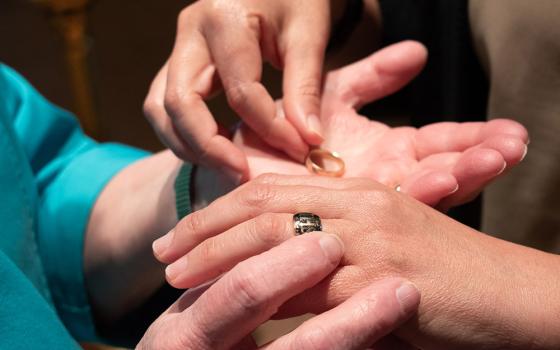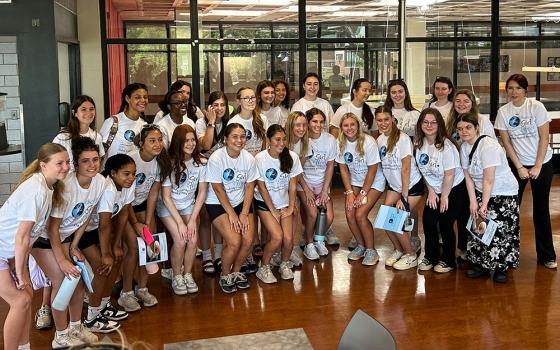
A webinar March 9 on the challenges women religious congregations face with aging members was hosted by the International Union of Superiors General and sponsored by the Conrad N. Hilton Foundation. From left, upper row: Sr. Pat Murray, executive secretary of UISG; Sr. Siobhan O'Keeffe, a registered nurse, expert in dementia care, and member of the Sacred Hearts of Jesus and Mary; Sr. Carol Zinn, executive director of the Leadership Conference of Women Religious. Sr. Maria Nirmalini, national president of the Conference of Religious India, and Fr. Thomas Gaunt , executive director of the Center for Applied Research in the Apostolate at Georgetown University. (GSR/Dan Stockman)
Congregations of women religious around the world are grappling with how to care for their elderly and ailing members, a challenge that is growing in size and complexity and that has cultural contexts but also universal needs.
Participants in the International Union of Superiors General webinar "Our Sisters, Our Future: Health and Spiritual Care for Aging" March 9 heard from presenters that the percentage of sisters who are elderly is expected to increase globally over the next decades, not just in areas such as Europe and the Americas where the number of sisters is already declining and congregations are aging. The webinar was sponsored by the Conrad N. Hilton Foundation, with a second session scheduled for April 11. (The Hilton Foundation is also a major funder of Global Sisters Report.)
Fr. Thomas Gaunt, executive director of the Center for Applied Research in the Apostolate at Georgetown University, said that while the number of sisters is growing in some areas, such as Africa and southeast Asia, the rate of increase has slowed. More troubling, the number of Catholic child baptisms has declined in every part of the world, meaning the pool of potential vocations will be shrinking.
"We're not likely to be seeing that same growth" in vocations seen in Africa and southeast Asia in the next two decades, Gaunt said, "simply because the number of young Catholics is declining."
Fewer vocations means the proportion of professed sisters who are older will continue to increase, and the need to care for them physically, mentally and spiritually will grow, as well.
Advertisement
"The realities in every country can be very, very different and the challenges that go with them," Gaunt said, but focus groups held in Kenya, Mexico, the United States and Vietnam found that the issues of caring for elderly and ailing sisters are largely universal.
The focus group participants said it is difficult and expensive to provide health care for elderly sisters, especially those with dementia; it's hard to provide facilities for elderly sisters while not isolating them from the community; mental health care is especially difficult to provide, and it's challenging to meet their emotional and spiritual needs.
Proposed solutions included ideas such as collaborating with other congregations on a shared health care facility or partnering with organizations such as local colleges.
Sr. Pat Murray, executive secretary of UISG, said a holistic approach is needed, because vowed sisters need and deserve more than just having their physical needs met.
"Our desire is to live with vibrance," said Murray, a member of the Institute of the Blessed Virgin Mary, also known as the Loreto Sisters.
Sr. Maria Nirmalini, a sister of the Apostolic Carmel and national president of the Conference of Religious India, said that when sisters' health declines to where they must end their active ministry, they often lose a sense of hope and feel they are being told they are no longer needed. Particularly important, she said, is preparing sisters for the transition period from active ministry to reduced ministry or retirement.
Sr. Carol Zinn, a Sister of St. Joseph of Philadelphia and the executive director of the Leadership Conference of Women Religious, said that loss of hope must be countered by a lifetime of formation, so that all sisters, even the elderly, have a sense of identity and belonging. Efforts need to be made to ensure even elderly sisters can participate to the best of their ability. Some accommodations in meetings include points like making sure acoustics allow sisters to hear better, providing large print materials and gathering elderly sisters together and engaging with them to ensure they are participating.
"We need to treat them with great dignity and respect, helping them be what they can be," Zinn said, and ensuring they know "they are part of the community until the day they die."
While the physical needs must be met, she said, there is much more to caring for an older sister — just as she has made vows to the community, the community has made vows to her.
"It's a prayer life, it's a shared life, it's a consecrated life until we meet God," Zinn said. "We have to help our members live that to the fullest. … We are one another's family in a way other vocations are not."
A second session on April 11 will focus more on strategies and solutions, said Sr. Jane Wakahiu, associate vice president of program operations and head of the Catholic Sisters initiative at the Hilton Foundation. The foundation is willing to direct resources to elder care for sisters, but solutions will be different on each continent, said Wakahiu, a member of the Little Sisters of St. Francis. The hope is to form a global committee to put the resources. A paper from the research by CARA, along with UISG, to document the issues is also planned. "As a global sisterhood we have a responsibility" to care for aging members, she said.








